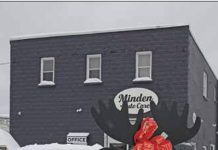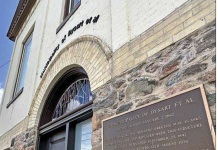Neighbours and advocates are relieved after officials removed 11 hunting dogs from Minden properties during an animal welfare investigation.
Officials removed the dogs Feb. 13, due to the owner not complying with orders relating to standards of care, according to the Ministry of the Solicitor General. Fourteen dogs were initially chained to insulated dog houses on an uninhabited property, according to the property owner. The ministry said the dogs were brought to humane societies, but no information was available on the three dogs unaccounted for as of Feb. 18.
Shanna Dryburgh was one of the neighbours who originally reported the issue Jan. 22 due to concern over the dogs’ conditions. She said it’s bittersweet seeing the dogs removed.
“In the back of my mind, I didn’t want anything to be wrong,” Dryburgh said, adding she feels bad for the property owner. “But it’s a relief that there’s an acknowledgement. (Dogs) being left unattended in this community is not something hopefully, going forward, that will be tolerated.”
The property owner could not be reached for comment after his dogs’ removal. In an interview before the dogs were taken, he said his setup is common among hunters. He also said his dogs were in good health, and he attended the property twice a day.
Officials did not initially seize the dogs. An OPP press release Jan. 30 said animal welfare investigators were working with the property owner to improve property conditions.
Dryburgh described the public response as “overwhelming.” A video of the dogs went viral, attracting tens of thousands of shares and comments on Facebook. One online petition, calling for an investigation as to why the dogs were not initially removed, garnered 10,023 signatures.
She said she still has concerns about how the officials handled the investigation and believes they should have taken the dogs right away.
“It would have stopped all the public outcry,” she said, adding the owner could get the dogs back after fixing any issues with their habitat. “It’s better to err on the side of caution and just get them out of there.”
The Ministry of the Solicitor General said Feb. 11 a veterinarian was called to two Minden properties to aid the investigation. But the Jan. 30 OPP press release makes no mention of a vet. After being asked whether a vet was called when investigators first attended the site, the ministry said it could not comment as it is an ongoing investigation.
Advocate: outcry made a difference
Lynn Perrier is a long-time animal welfare advocate who started the petition. She said she feels the public outcry made a difference in how the ministry handled the case
“We had over 10,000 signatures in two days. There’s no way that any government can ignore that,” Perrier said.
The case came in a time of transition for animal welfare in the province. The Provincial Animal Welfare Services (PAWS) Act came into effect Jan. 1, putting enforcement in the hands of the province instead of the Ontario Society for the Prevention of Cruelty to Animals (OSPCA).
Perrier said the new act has loopholes, as evidenced by this case. But she added the act is a good framework and the province will need more time to add more regulations for animal care.
“They really are totally inexperienced with this and I think we need to have patience,” Perrier said. “I have no doubt that eventually, we’re going to have an animal welfare system that is the best in Canada, but it’s going to take time.”
Laws come under scrutiny
The situation has put a new focus on the practice of tethering, or chaining dogs. It’s legal in Ontario, but another online petition, which cites this case, is calling for tethering to be banned. It has amassed more than 40,000 signatures.
In its code of practice for kennels, the Canadian Veterinary Medical Association (CMVA) said tethering is not allowed as a method of confining a dog to a primary enclosure, nor as the only means of containment. It also recommends dogs be monitored while tethered, and tethers be five times the length of a dog.
The Ontario Federation of Anglers and Hunters (OFAH) does not have a position on tethering, according to resources management specialist Lauren Tonelli.
But the OFAH is working on a new code of conduct for hunting dogs. Tonelli said the code will provide best practice, including for the training and care of hunting dogs. Outdoor care will also be mentioned.
“Really that idea of a weather-appropriate shelter, making sure they do have somewhere warm and out of the elements and somewhere they can always access water,” Tonelli said.
She said the OFAH is aware of the Minden case but could not comment on it specifically. She also said concerns raised by a situation such as this are broader than hunting.
“If anyone ever sees a situation where they’re concerned about the treatment of any animal, they should be contacting either their local municipality or the OPP,” she said. “It’s not a hunting dog issue, it’s a dog owner issue.”
Minden bylaws are also coming under scrutiny. The municipality restricts rural properties to nine dogs, besides kennels. But Dryburgh said even nine is too many and plans to make a delegation to council.
“At nine dogs, there are sanitary issues, there are noise issues,” Dryburgh said. “It’s just a crazy number.”





